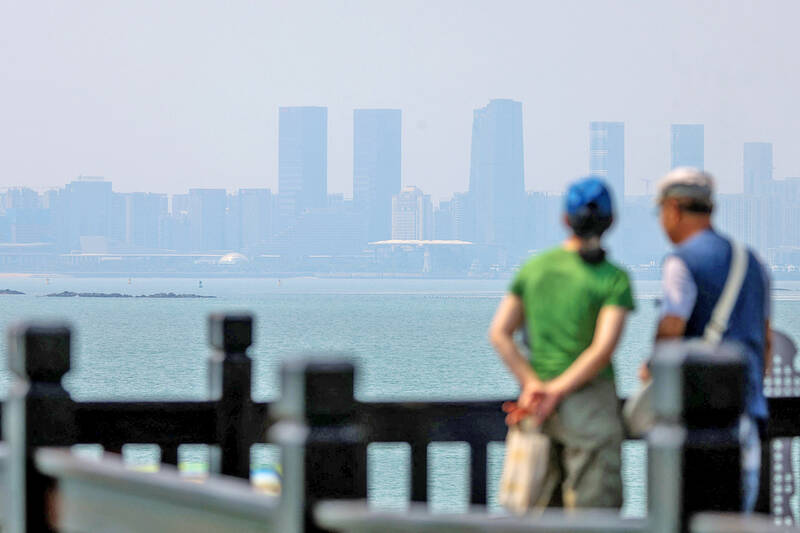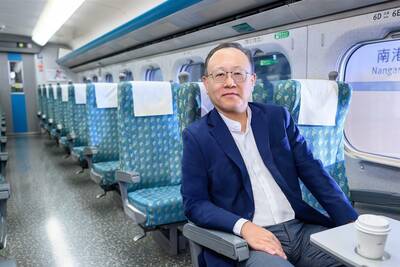With suitcases and packages stuffed with food, alcohol and construction materials, Taiwanese shoppers make their way toward a ferry in the Chinese city of Xiamen bound for the Taipei-administered island of Kinmen.
Passing through immigration, the travelers cannot miss a sign declaring: “One family on two sides of the strait, working together to fulfil our dreams.”
In the months leading up to tomorrow’s inauguration of president-elect William Lai (賴清德), China Coast Guard ships have made frequent appearances around the waters of Kinmen.

Photo: Cheng I-Hwa, AFP
Yet the deepening rift between Beijing and Taipei, and the threat of a conflict if China fulfils its promise to take Taiwan, appears to be the last thing on the minds of the Taiwanese passengers.
More than 700,000 people made the journey between Kinmen and China by ferry last year, the vast majority of them Taiwanese, and many of them seeking a bargain in the bustling markets of Xiamen.
Huang Chuang-yuan, who runs a seafood restaurant on Kinmen, is one of the many regulars traveling back and forth between the island and Xiamen. “China is a big market, they have more products and more variety of things — and things are much cheaper,” Huang, 57, said on Friday after arriving back at Kinmen with his haul. “But you need to watch the products very closely. Some are good but others are not.”
One of Taiwan’s many outlying islands, Kinmen, is just 5km and a world apart from the gleaming towers and upscale shopping malls populating Xiamen.
Before passengers can board the ferry in the Chinese city for the half-hour journey across the sliver of water separating it from Kinmen, they put their luggage through X-ray machines and then pass through immigration.
People push airport-style trolleys loaded with suitcases and large packages up a ramp and onto the ferry before taking their seats. Eight ferries run each day between the two sides, with the staff removing China’s national flag from the vessel when the boat moves closer toward Kinmen.
Chef Ji De-wei said he travels back and forth to Xiamen every month to stock up on products. “It’s super convenient to get there and it’s only a 30-minute ferry,” said the 45-year-old as three of his employees loaded his purchases onto a small truck.
Ji recently opened a restaurant in Kinmen, but instead of sourcing materials locally, he went to Xiamen. “Things are not cheaper but there is more choice,” he said.
Some passengers like Gail Lin had been in China for the sights, not the shopping. In China “things are very modern,” she gushed, adding that in Kinmen “things are a bit outdated.”
Meng-hsuan Lin, 28, hoped more Chinese citizens could visit Taiwan, including Kinmen, after Lai takes office tomorrow. “Kinmen is the safest place. Nothing can happen,” she said.

The inspection equipment and data transmission system for new robotic dogs that Taipei is planning to use for sidewalk patrols were developed by a Taiwanese company, the city’s New Construction Office said today, dismissing concerns that the China-made robots could pose a security risk. The city is bringing in smart robotic dogs to help with sidewalk inspections, Taipei Deputy Mayor Lee Ssu-chuan (李四川) said on Facebook. Equipped with a panoramic surveillance system, the robots would be able to automatically flag problems and easily navigate narrow sidewalks, making inspections faster and more accurate, Lee said. By collecting more accurate data, they would help Taipei

STATS: Taiwan’s average life expectancy of 80.77 years was lower than that of Japan, Singapore and South Korea, but higher than in China, Malaysia and Indonesia Taiwan’s average life expectancy last year increased to 80.77 years, but was still not back to its pre-COVID-19 pandemic peak of 81.32 years in 2020, the Ministry of the Interior said yesterday. The average life expectancy last year increased the 0.54 years from 2023, the ministry said in a statement. For men and women, the average life expectancy last year was 77.42 years and 84.30 years respectively, up 0.48 years and 0.56 years from the previous year. Taiwan’s average life expectancy peaked at 81.32 years in 2020, as the nation was relatively unaffected by the pandemic that year. The metric

TAKING STOCK: The USMC is rebuilding a once-abandoned airfield in Palau to support large-scale ground operations as China’s missile range grows, Naval News reported The US Marine Corps (USMC) is considering new sites for stockpiling equipment in the West Pacific to harden military supply chains and enhance mobility across the Indo-Pacific region, US-based Naval News reported on Saturday. The proposed sites in Palau — one of Taiwan’s diplomatic allies — and Australia would enable a “rapid standup of stored equipment within a year” of the program’s approval, the report said, citing documents published by the USMC last month. In Palau, the service is rebuilding a formerly abandoned World War II-era airfield and establishing ancillary structures to support large-scale ground operations “as China’s missile range and magazine

Passengers on Taiwan High Speed Rail (THSR) will be required to use headphones and make phone calls in gangways under new “quiet travel” rules starting Sept. 22. THSR Chairman Shih Che (史哲) told media that THSR will run a three-month promotional campaign to ensure widespread adoption of the new rules. Those repeatedly ignoring the guidance face the potential termination of their transport contract, which can result in them getting escorted off the train, according to THSR. Shih shared his hope to cultivate an environment conducive to rest and reading for the train’s passengers, stating that these changes aim to “promote self-discipline” among passengers